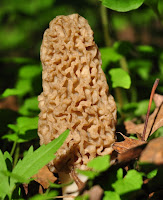
 Although definitely winding down, this year's spring mushroom season
continues -- at least in the extreme northeast corner of the state.
Although definitely winding down, this year's spring mushroom season
continues -- at least in the extreme northeast corner of the state. 
 In
reality, there are only two basic ways to cook these out-of-this-world
taste treats --- indoors or outdoors. Or to put it another way,
civilized or uncivilized. The indoor method utilizes clean natural gas
and can often involve complex recipes. The outdoor method utilizes
natural fuels gathered from the same woodlands where the mushrooms were
gathered. Other than the morels themselves, this method involves but
one additional ingredient -- butter. For open fire cooking, I prefer to
use a flat cast iron utensil. While waiting for burning wood to become
coals, I use the time to clean fish or halve the mushrooms. Most
people think that, before cooking, they need to cut, wash, salt, soak,
and then carefully inspect each and every morel before they can even
begin to think about cooking. This is nuts. Anyone who would treat a
fresh morel that way should have their stick matches taken away and be
forced to eat at fast food drive-throughs. Culinary works of art, morel
mushrooms are much too delicate for such barbaric treatment. The only
thing that washing and soaking will accomplish is that the mushrooms
will become tasteless, soggy and fall apart. Fresh morels deserve
respect. They should be consumed; not tortured. Once captured, morels
should be taken directly to the fire, cut in half, and cooked in
butter. That's it; nothing else -- no washing, no salt, no nothing.
Well, a hint of olive oil maybe; but since we're hunting and cooking in
northeast Iowa's dairy country, I'll stick with the butter.
In
reality, there are only two basic ways to cook these out-of-this-world
taste treats --- indoors or outdoors. Or to put it another way,
civilized or uncivilized. The indoor method utilizes clean natural gas
and can often involve complex recipes. The outdoor method utilizes
natural fuels gathered from the same woodlands where the mushrooms were
gathered. Other than the morels themselves, this method involves but
one additional ingredient -- butter. For open fire cooking, I prefer to
use a flat cast iron utensil. While waiting for burning wood to become
coals, I use the time to clean fish or halve the mushrooms. Most
people think that, before cooking, they need to cut, wash, salt, soak,
and then carefully inspect each and every morel before they can even
begin to think about cooking. This is nuts. Anyone who would treat a
fresh morel that way should have their stick matches taken away and be
forced to eat at fast food drive-throughs. Culinary works of art, morel
mushrooms are much too delicate for such barbaric treatment. The only
thing that washing and soaking will accomplish is that the mushrooms
will become tasteless, soggy and fall apart. Fresh morels deserve
respect. They should be consumed; not tortured. Once captured, morels
should be taken directly to the fire, cut in half, and cooked in
butter. That's it; nothing else -- no washing, no salt, no nothing.
Well, a hint of olive oil maybe; but since we're hunting and cooking in
northeast Iowa's dairy country, I'll stick with the butter.  "What about
those insects," you ask? Not to worry. As things start to heat up
most insects, especially the larger species, will quickly escape the
morel's folds -- but much to their dismay, will usually not survive the
swim through bubbling butter. No matter, once exposed, the drifting
insects are easy to work around. Smaller insect life? Also no problem;
you usually can't see and never will taste them -- so just eat and
enjoy.
"What about
those insects," you ask? Not to worry. As things start to heat up
most insects, especially the larger species, will quickly escape the
morel's folds -- but much to their dismay, will usually not survive the
swim through bubbling butter. No matter, once exposed, the drifting
insects are easy to work around. Smaller insect life? Also no problem;
you usually can't see and never will taste them -- so just eat and
enjoy.  By the end of the annual mushroom run, any hunter worth his salt
will smell like wood smoke, have consumed more bugs than a missionary,
and will have blood samples running about 25 percent butter. Although
the morels will soon be gone, I'm already looking forward to September's
first batch of chicken-of-the-woods.
By the end of the annual mushroom run, any hunter worth his salt
will smell like wood smoke, have consumed more bugs than a missionary,
and will have blood samples running about 25 percent butter. Although
the morels will soon be gone, I'm already looking forward to September's
first batch of chicken-of-the-woods.I Remain,
Pastor Steve
No comments:
Post a Comment